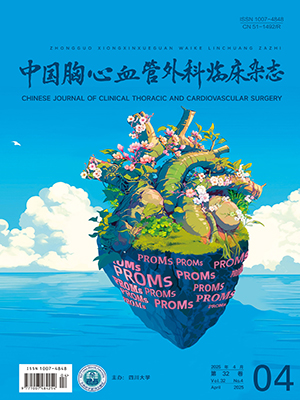| 1. |
Smulter N, Lingehall HC, Gustafson Y, et al. Delirium after cardiac surgery: Incidence and risk factors. Interact Cardiovasc Thorac Surg, 2013, 17(5): 790-796.
|
| 2. |
Bucerius J, Gummert JF, Borger MA, et al. Predictors of delirium after cardiac surgery delirium: Effect of beating-heart (off-pump) surgery. J Thorac Cardiovasc Surg, 2004, 127(1): 57-64.
|
| 3. |
Eriksson M, Samuelsson E, Gustafson Y, et al. Delirium after coronary bypass surgery evaluated by the organic brain syndrome protocol. Scand Cardiovasc J, 2002, 36(4): 250-255.
|
| 4. |
Rudolph JL, Jones RN, Levkoff SE, et al. Derivation and validation of a preoperative prediction rule for delirium after cardiac surgery. Circulation, 2009, 119(2): 229-236.
|
| 5. |
Crocker E, Beggs T, Hassan A, et al. Long-term effects of postoperative delirium in patients undergoing cardiac operation: a systematic review. Ann Thorac Surg, 2016, 102(4): 1391-1399.
|
| 6. |
Hollinger A, Siegemund M, Goettel N, et al. Postoperative delirium in cardiac surgery: An unavoidable menace? J Cardiothorac Vasc Anesth, 2015, 29(6): 1677-1687.
|
| 7. |
Falsini G, Grotti S, Porto I, et al. Long-term prognostic value of delirium in elderly patients with acute cardiac diseases admitted to two cardiac intensive care units: a prospective study (DELIRIUM CORDIS). Eur Heart J Acute Cardiovasc Care, 2017, 7(7): 661-670.
|
| 8. |
Hirsch J, DePalma G, Tsai TT, et al. Impact of intraoperative hypotension and blood pressure fluctuations on early postoperative delirium after non-cardiac surgery. Br J Anaesth, 2015, 115(3): 418-426.
|
| 9. |
Plaschke K, Fichtenkamm P, Schramm C, et al. Early postoperative delirium after open-heart cardiac surgery is associated with decreased bispectral EEG and increased cortisol and interleukin-6. Intensive Care Med, 2010, 36(12): 2081-2089.
|
| 10. |
Stelfox HT, Ahmed SB, Zygun D, et al. Characterization of intensive care unit acquired hyponatremia and hypernatremia following cardiac surgery. Can J Anaesth, Springer, 2010, 57(7): 650-658.
|
| 11. |
Lindner G, Funk GC, Lassnigg A, et al. Intensive care-acquired hypernatremia after major cardiothoracic surgery is associated with increased mortality. Intensive Care Med, 2010, 36(10): 1718-1723.
|
| 12. |
Cecconi M, Hochrieser H, Chew M, et al. Preoperative abnormalities in serum sodium concentrations are associated with higher in-hospital mortality in patients undergoing major surgery. Br J Anaesth, 2016, 116(1): 63-69.
|
| 13. |
Tsipotis E, Price LL, Jaber BL, et al. Hospital-associated hypernatremia spectrum and clinical outcomes in an unselected cohort. Am J Med, 2018, 131(1): 72-82.
|
| 14. |
Thongprayoon C, Cheungpasitporn W, Yap JQ, et al. Increased mortality risk associated with serum sodium variations and borderline hypo- and hypernatremia in hospitalized adults. Nephrol Dial Transplant, 2019. [Epub ahead of print].
|
| 15. |
Lee SB, Oh JH, Park JH, et al. Differences in youngest-old, middle-old, and oldest-old patients who visit the emergency department. Clin Exp Emerg Med, 2018, 5(4): 249-255.
|
| 16. |
Nashef SAM, Roques F, Michel P, et al. European system for cardiac operative risk evaluation (EuroSCORE). Eur J Cardiothorac Surg, 1999, 16(1): 9-13.
|
| 17. |
穆心苇, 牛永胜, 施乾坤, 等. 临床路径在冠状动脉旁路移植术后ICU管理中的应用. 中华医院管理杂志, 2005, 21(3): 165-167.
|
| 18. |
Ely EW, Bernard GR, Speroff T, et al. Delirium in mechanically ventilated patients: Validity and reliability of the Confusion Assessment Method for the intensive care unit (CAM-ICU). JAMA, 2001, 286(21): 2703-2710.
|
| 19. |
Muhsin SA, Mount DB. Diagnosis and treatment of hypernatremia. Best Pract Res Clin Endocrinol Metab, 2016, 30(2): 189-203.
|
| 20. |
Waite MD, Fuhrman SA, Badawi O, et al. Intensive care unit-acquired hypernatremia is an independent predictor of increased mortality and length of stay. J Crit Care, 2013, 28(4): 405-412.
|
| 21. |
Yang Y, Shen C, Lu J, et al. Early continuous ultrafiltration in Chinese patients with congestive heart failure (EUC-CHF): study protocol for an open-label registry-based prospective clinical trial. BMC Cardiovasc Disord, 2019, 19(1): 249.
|
| 22. |
Maldonado JR, Wysong A, Van Der Starre PJA, et al. Dexmedetomidine and the reduction of postoperative delirium after cardiac surgery. Psychosomatics, 2009, 50(3): 206-217.
|
| 23. |
吴庆琛, 王小文, 张诚, 等. 右美托咪定对体外循环心脏手术后患者围术期预后影响的系统评价与Meta分析. 中国胸心血管外科临床杂志, 2018, 25(4): 325-332.
|




